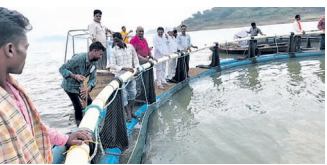Bhawanipatna: The state government has approved the creation of an exclusive “Indravati Fish” brand to give a distinct identity to fish produced in the Indravati reservoir of Kalahandi district.
According to official sources, J Kerketa, Joint Secretary of the state government, directed the Fisheries Director September 11 to prepare and submit a detailed report on fish farming activities in the reservoir and the proposed branding initiative.
The move follows a proposal submitted by Prateek Joshi, district coordinator of the Swadeshi Jagaran Manch (SJM) and Swavalambi Bharat Abhiyan (SBA), urging the government to launch the brand. Taking note of the proposal, the Chief Minister’s Office instructed Fisheries officials to prepare a detailed project report.
Also Read: Maa Manikeswari University tags trees with QR codes
Officials said the Indravati reservoir offers significant potential for fishery development. Local fishermen have long depended on it, while the district fisheries department has promoted cage culture — breeding fish in enclosures placed in the reservoir. This system has helped many local farmers achieve self-reliance.
As part of an initial pilot project in Thuamul Rampur block’s Sanchatrang area, one circular and two rectangular cages were set up in the reservoir and stocked with Amur Carp fingerlings.
Within three to four months, the fish grew to 1 kg each, with yields of 30-40 kg per cubic meter, officials said. The district has about 10,000 registered fish farmers, producing 31,000 metric tonnes of fish annually. In 2020, Kalahandi was recognised as the best-performing district in fisheries nationwide.
Officials added that demand for quality freshwater fish is rising steadily in Odisha, and the Indravati reservoir can meet both local needs and generate surplus for export to other states.
If promoted under a unique brand, Indravati fish could establish Kalahandi as a fisheries hub, reducing dependence on Andhra Pradesh, Chhattisgarh and West Bengal.
Joshi expressed hope that the initiative would boost production, strengthen fisheries cooperatives, increase income for women’s self-help groups, and secure livelihoods across the district.
PNN
